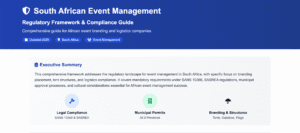The intricacies of the event management process are many, and in South Africa, the task of planning successful events demands a structured approach. Whether the occasion is grand or intimate, the event planning stages function as a guiding compass, steering each detail towards exquisite realization. From the genesis of an idea to the final applause, South African event coordinators recognize the significance of a robust framework for seamless event execution.
The breadth and depth of South African cultures, landscapes, and corporate objectives entail unique challenges and nuances in event planning. Adhering to the core stages of event management, South African planners artfully embroider the fabric of a successful gathering, ensuring each stage is meticulously addressed and every event shines with excellence.
Key Takeaways
- The necessity of a well-structured event management process.
- Understanding the pivotal steps involved in planning events in South Africa.
- Implementing strategic planning from event inception to conclusion.
- Maintaining organizational standards throughout the event planning stages.
- The adaptability of South African event management to various event formats.
Setting the Foundation: The Importance of Research and Goal Setting in Event Planning
Initial event planning forms the backbone of any successful event strategy, especially in the vibrant landscapes of South Africa. A fundamental component of this is defining the event vision, closely followed by setting event goals and establishing performance benchmarks to ensure ROI-driven events. In this section, we delve into the methodologies adopted by South African event planners to crystallize the event’s purpose and chart a course for measurable achievements.
Deciphering the Events’ Purpose and Vision
Before diving into logistics and design, South African event professionals prioritize a deep understanding of what drives an event to fruition. Defining an event vision involves serious reflection on the anticipated impact the event will have on both the host and the participants. This critical exercise paves the way for a strategic development of event planning guidelines, fulfilling client expectations while infusing local flavor and global standards.
Pinpointing Goals for Measurable Success
In the realm of event planning, a focus on quantifiable targets is non-negotiable. This emphasis allows South African event organizers to draw up precise, measurable objectives that not only act as a yardstick for evaluating whether an event is ROI-driven but also facilitate a clear trajectory for event strategies that need to be implemented.
Delineating Objectives to Guide Event Direction
It is the granular, actionable objectives that transform the conceptualized vision into tangible steps forward. When setting these event objectives, South African professionals ensure that they are measurable and accompanied by clear timelines. This fosters an environment where every element of the event is designed to contribute to the overarching goals, ultimately defining what success looks like.
| Event Planning Component | Description | Benefits |
|---|---|---|
| Initial Research | Gathering insights on the purpose and significance of the event. | Aligns event with strategic objectives. |
| Defining Vision | Articulating a clear picture of the event’s desired outcomes. | Provides inspiration and direction for all planning stages. |
| Setting Goals | Developing specific and time-bound targets to evaluate performance. | Facilitates targeted planning and resource optimization. |
| Performance Benchmarks | Establishing standards for measuring event success. | Enables real-time tracking and post-event analysis. |
| ROI-Driven Objectives | Creating financial and engagement targets. | Ensures the event generates value for stakeholders. |
A firmly rooted foundation in research and goal setting not only amplifies the chances of hosting a landmark event in South Africa but also grooms a legacy of strategically sound, ROI-driven gatherings. Next, we turn our attention to how these preparatory steps manifest into an immersive and memorable event experience.
What are the 5 stages of event management?
The intricate tapestry of event planning and event organization in South Africa is expertly woven through a series of methodical stages. Each of these stages of event management is crucial in transforming an idea into a full-fledged, memorable event. They form the backbone of the event execution process, guiding planners through a structured progression towards achieving their ultimate goal: a successful event outcome that resonates with all stakeholders involved.
- Goal and Objective Setting – It begins with laying down a clear foundation for the event. Planners identify the core purpose and desired outcomes, ensuring all plans align with these benchmarks.
- Budget Creation – A comprehensive budget plan is essential in mapping out the financial aspect of the event, detailing allocations for various resources.
- Event Design and Planning – The creative phase where the event’s concept is born, focusing on crafting an engaging atmosphere and experiences that linger in attendees’ memories.
- Coordination and Execution – The practical execution of the event, where logistics come into play, incorporating meticulous coordination and management to ensure a smooth experience.
- Evaluation and Feedback – A critical assessment of the event’s impact, utilizing feedback to analyze success and pinpoint areas for future improvements.
In South Africa, these stages provide a framework that ensures meticulous event evaluation and a systematic approach to event management. From Johannesburg’s bustling cityscape to the serene vistas of the Cape, these principles hold true for any event, whether it is corporate gatherings, vibrant festivals, or international conferences.

Each stage contributes to an overarching narrative of thorough event planning, which is imperative in the dynamic landscape of South African event organization. Mastering these stages means mastering the art of creating events that are not only successful in their execution but also leave a lasting, positive impact on all who partake.
Maximizing Event Impact: Design, Coordination, and Execution
Creating a truly memorable event experience in South Africa involves myriad details that transform a simple gathering into a resonant affair. It’s about meticulously weaving together event planning components to captivate guests with an enchanting event atmosphere.
Crafting a Cohesive Event Design
The first stride towards a captivating event resides in envisioning the design. It’s more than just aesthetics; it’s about ensuring every component blends seamlessly – from the tangible allure of the venue to the unseen charm of the background score. The winning factor is the synergy between various technical resources that foster an immersive experience indelibly etched in the attendees’ memories.
Assembling your Dream Event Management Team
The adage ‘teamwork makes the dream work’ holds profoundly true when we steer towards the South African event committees. A robust event management team is your ally in breathing life into the planned affair. They are the master crafters, from strategists who piece together the event’s grand narrative to the technical wizards who ensure that every light cue and sound note is nothing short of perfection.
Navigating Venue and Date Selection for Optimal Attendance
The dual factors of venue selection and event date are pivotal in surging event attendance. The choice must resonate with the ethos of the event, the comfort of guests, and the accessibility for all. Meticulous attention is paid to venue availability, with considerations for seasonal peaks and audience preferences, all to ensure that on that one special day, the event shines as a beacon in South Africa’s social calendar.
Conclusion
In the dynamic realm of event management, particularly within the vibrant context of South Africa, the culmination of any event is marked by a comprehensive process of event evaluation. Assessing the outcomes with a critical eye, planners scrutinize each detail against their initial ambitions. It is in this retrospective view that the true measure of event planning success is discovered. Feedback mechanisms play a pivotal role; post-event reflections provide a wealth of knowledge that can drive future advancements in the industry.
For event professionals in South Africa, success is not solely determined by what unfolds during the event, but equally by the lessons learned after the final attendee has departed. This valuable post-event feedback is gathered from a myriad of sources—from direct participant comments to data analytics. Analyzing these insights affords planners the opportunity to refine strategies, improve engagement, and enhance logistical execution for successive events.
The commitment to continuous improvement is what elevates South African event planners in an increasingly competitive market. Every phase—from conception to completion—is regarded as a stepping stone towards excellence. In the world of event planning, success is a journey, not merely a moment in time, and the diligent application of lessons learned through event evaluation propels the industry forward. South African event management thus becomes synonymous with an ethos of perpetual progress and a relentless pursuit of creating events that are not just good, but truly exceptional.
Maximizing Event Impact: Design, Coordination, and Execution
Why is defining an event’s purpose and vision critical in the initial stages of planning?
Defining the event’s purpose and vision is essential as it ensures that the event aligns with the host’s overarching aims. Understanding the rationale behind the event helps to clarify desired outcomes for both host and attendees, setting a solid foundation for the subsequent stages of event planning in South Africa.
How do goals contribute to the success of an event in South Africa?
Goals are pivotal in event planning as they provide measurable benchmarks for evaluating performance and facilitate ROI-driven decision-making. By establishing specific, quantifiable goals, South African event planners can aim for clear targets such as lead generation, sales increases, or enhanced attendee engagement.
What role do event objectives play in the event planning process?
Objectives translate the event vision into actionable steps. They serve as guidelines that steer the course of the event, influencing decision-making throughout the planning phase. In South Africa, effective event planning necessitates measurable and time-bound objectives to ultimately evaluate the event’s success.
What encompasses the five stages of event management in South Africa?
The five stages of event management in South Africa include:
1. Goal and Objective Setting – identifying the purpose and the desired outcomes of the event.
2. Budget Creation – outlining the financial parameters and allocating resources economically.
3. Event Design and Planning – envisioning the event environment and detailing to deliver memorable experiences.
4. Coordination and Execution – managing logistics to bring the event to fruition.
5. Evaluation and Feedback – assessing the event’s impact against the set goals and seeking areas for improvement.
Why is event design important in event management?
Event design is crucial in creating an engaging and cohesive atmosphere that resonates with attendees. It encompasses selecting appropriate venues, technological setups, and crafting attendee activities that harmonize to deliver a compelling and memorable event experience in South Africa.
What are key considerations when assembling an event management team?
When putting together an event management team, it’s important to select individuals who can fulfill various specialized roles effectively. This may include technical support, catering management, or a production crew. Clear role definitions, task delegation, and the establishment of cohesive workflows are critical for successful event coordination in South Africa.
How is venue and date selection crucial to event attendance?
Selecting the right venue and date ensures optimal attendance and contributes to the event’s success. Factors like seasonal considerations, attendee demographics, and venue availability must be taken into account in South Africa. Venue staff collaboration and detailed research are employed to achieve the event’s attendance goals.




